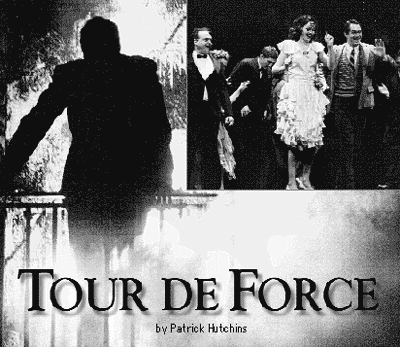
The Montana Rep gets its act
together and takes it on the road
|
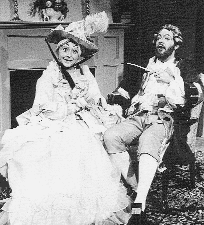
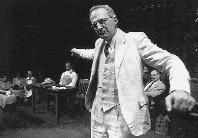
She Stoops to Conquer in the Montana Rep's debut 1967 season; Mikel MacDonald in To Kill a Mockingbird, the show that toured for two years
|
Gary Fish remembers well the night the wheels came off the Montana Repertory Theatre. A small caravan of actors and prop vehicles was headed across North Dakota, taking To Kill a Mockingbird out on the road as part of their grueling tour schedule. Suddenly the company U-Haul up ahead gave a lurch and, in a shower of sparks, shed one of its wheels, which came bounding straight toward the professional actor. The tire bounced off Fish's fender and disappeared. The badly shaken company pulled off the road and assessed the damage. No one had been hurt, and after the sets, costumes and props were transferred to a new truck, the show, of course, went on--to its next engagement in a small-to-medium-sized auditorium somewhere in America.
Road mishaps notwithstanding, the University's resident professional theater company has been on a roll for the past decade. Under the guidance of its affable artistic director, Greg Johnson, the Rep's carefully selected shows have proven popular with audiences, and what was once a tour of the region now covers most of the United States. Fish reports visiting forty-seven states in the last four years.
Significantly, the company gets invited back by the local subscription series that are the bread and butter of touring theater companies, and the Rep's new production of It's a Wonderful Life boasts solid bookings for the next two years. Perhaps equally important is the high caliber of the equity actors--professional, dues-paying members of the actors' guild--who have been persuaded to lend their skills to the Rep. Along the way, the company has spawned a small family of related theater groups, including the Young Rep, which specializes in new or experimental plays; the Colony, a summer residential playwriting workshop; Educational Outreach, which brings workshops to students of all ages; and Johnson's latest interest, a community theater project.
The Rocky Road to Success
|
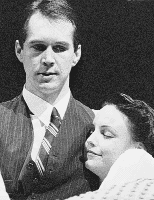 |
| Kelly Boulware and Eden Atwood reinvent vintage icons James Stewart and Donna Reed. |
The Montana Repertory Theatre was launched in 1967 as a student theater within the University's drama/dance department. According to Steve Wing, production manager and unofficial historian of the company, alumnus founder Firman "Bo" Brown intended from the start for the Rep to become a professional theater operating within the University's structure. Yet it wasn't until a decade later that the company, struggling to justify its existence and in danger of being defunded by the state arts council, finally achieved professional status.
Newly appointed department chair James Kriley made the decision to go pro in 1977 in an effort to buff up the Rep's lackluster image, which had suffered--as all student companies do--from an inconsistency of talent from year to year. Kriley moved decisively to provide the company a reasonable operating budget and, with the help of a statewide task force, persuaded the Montana Legislature to provide a "program modification" to the tune of $180,000 over two years. The money allowed the company to hire the professional actors, directors and set designers needed to attract paying audiences. For several years after it went pro, students were not directly involved in the Rep's productions, though now the company depends on graduates and undergraduates.
Kriley credits strong support from the Legislature, which awarded the company another grant in 1991, and the University administration for the Rep's survival and resurgence. It was Kriley, too, who as dean of the School of Fine Arts, hired Greg Johnson in 1990 and launched the company's modern era of crowd-pleasing productions and box office successes. Johnson had spent nineteen years in New York as a professional actor and director. He knew that if the Rep were to succeed financially, it would have to offer audiences something other than difficult, experimental drama.
Telling American Stories | | Tour of duty: Cross-country hot spots for the Rep. The tour lasts up to two years. |
It is emblematic of the Rep's philosophy that its most recent productions have offered powerful stories already well known as classic American movies. Filled with bravery, cruelty, despair, hope and sentiment, these plays also feature what used to be called, in a less cynical age, heroism. And they are sure-fire box office hits. The success of last year's To Kill a Mockingbird was "unprecedented," Johnson says. "It far exceeded our expectations--by thousands of people and thousands of dollars." Mockingbird, like the new production of It's a Wonderful Life, is quintessentially American, and Johnson makes no apologies for the popular appeal. "I think we've hit a very rich vein of ore here with these kinds of stories, especially in this day and age when we are all asking the question, 'What is the American character?' These are the stories we tell each other as Americans."
Johnson's conviction that there is an audience for "a good story well told" is born out by the repeat bookings. Says Kriley, "This company is dead tomorrow if the people who hire it don't call back. At the same time that the Montana Rep has been growing, over 60 percent of the touring theater companies have collapsed." Kriley credits Johnson for much of the success: "He's got great inventiveness, imagination and, just as importantly, a great business sense." Characteristically, Johnson passes the credit back to Kriley and to such people as teacher and set designer Bill Raoul and the students themselves.
A Wonderful Life for the Actors
|
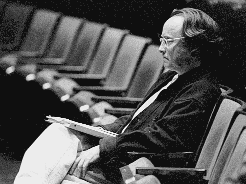 |
| Director Greg Johnson studies a final rehearsal. |
Talk to the people involved in the Rep's new production of Frank Capra's It's a Wonderful Life (which opened in the Montana Theatre in February before touring the nation) and you'll sense excitement. Kelly Boulware is a twenty-nine-year-old professional actor whom Johnson hired out of Seattle to play George Bailey. Despite the daunting prospect of reprising Jimmy Stewart, Boulware relishes the opportunity. "I haven't seen the movie in years," he says. "This is a new script that sets a new tone in the first ten seconds. It's going to be me fleshing out the details and living in the script."
His co-star, Eden Atwood, notes that the new adaptation remains a period piece set in the thirties and forties, yet she says, "I don't want my performance [as George's wife, Mary,] to appear dated, a caricature of Donna Reed. I want to give it a nineties' sensibility." Unlike Boulware, Atwood is a student, if a nontraditional one: Butte native and granddaughter of Montana literary figure A. B. Guthrie Jr., she returned at age twenty-nine to UM to study drama, following a successful career as a television actor and jazz singer. |
 |
| Members of the company load sets and costumes into the trucks before the tour. |
Yet even unpaid student intern Brendan Shanahan, who plays Mr. Welch and George Bailey's younger brother, Harry, is thrilled to have the opportunity to hit the road with the Rep. "It's a chance to work with people and learn things that you'd never get otherwise. My biggest fear for a long time was of screwing up their show," he says.
If mainstream shows are an important source of revenue for the Rep, its offspring, the Young Rep, provides a showcase for the avant-garde. "It's the experimental wing," Johnson says. "We are very active doing Mamet, Shepard, Eric Bogosian, all the new plays out of New York. It was created to be an outreach company for Missoula. We play everywhere--in bars, at the Elks Club, at Fort Missoula. The avant-garde in me says not only is the material supposed to be different, but where you play should be different, too." Students and community members who have ideas for shows are encouraged to produce them under the Young Rep's imprimatur.
Equally dear to Johnson's heart is the Colony, a playwriting workshop held on campus in June for the past three years, in which such playwrights as Pulitzer Prize-winner Marsha Norman gather with promising students for two weeks of intensive work. New on the Rep's horizon is a program that will visit Montana high schools, featuring three-day workshops that support and expand the training offered by local drama teachers. "We're creating a mobile stage, and we're getting ready to go," Johnson says. Then, like a kid planning a new treehouse, he confides yet another dream: a resident company for Missoula that would make use of the community's many actors, directors, lighting and set designers, and other theater professionals to produce classic American plays for presentation in larger venues. "But," he cautions, chuckling, "We haven't even had our first meeting yet, so there's no telling how it will turn out."
Ultimately, the game plan for the Montana Rep is to use its commercial success as a touring company to help finance these less commercially viable but valuable projects. If the past decade is any indication, that probably means live theater will play an even larger part in the cultural life of the state.
Patrick Hutchins is a freelance writer based in Missoula.
| A Real-Life Mockingbird
When the Montana Rep presented To Kill a Mockingbird in Galax, Virginia, last year, the actors were disconcerted by the unusual silence that greeted them right from the beginning of the performance. Robert M. Gutierrez, one of the student members of the company, remembers that despite a good performance by the cast, people failed to respond in the usual places. Members of the company feared they had finally found the ultimate bad audience, but like good show-business troupers, the actors labored on. At the end of the play they were surprised and gratified by a resounding ovation. Only then did they learn that the town had experienced a brutal racial murder earlier in the year. In a completely unexpected way, Gutierrez says, the company had participated in the town's healing process. |


|